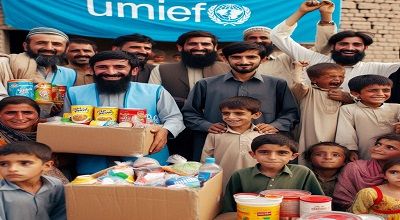Role of UNICEF in Pakistan
The United Nations Children’s Fund (UNICEF) plays a crucial role in Pakistan in promoting the rights and well-being of children. Its focus areas include health, education, nutrition, water and sanitation, child protection, and social policy. UNICEF works closely with the government of Pakistan, and non-governmental organizations (NGOs).
Other partners to implement programs and initiatives aimed at improving the lives of children and mothers. UNICEF is the United Nations Children’s Fund, a global organization that works to protect and promote the rights and well-being of every child. UNICEF has been working in Pakistan since 1948, supporting various programs. And initiatives to improve the lives of children and their families.
Some of the latest updates on UNICEF’s role in Pakistan are:
United Nations Children’s Fund is helping to fight against polio. A crippling and potentially fatal disease that still threatens children in Pakistan. Supports community health workers who go door-to-door to vaccinate children and raise awareness about the importance of immunization. It also provides cold chain equipment, social mobilization, training, and supervision for the polio eradication campaign.
UNICEF is responding to the humanitarian crisis caused by the floods in 2022. Which affected millions of people and damaged or destroyed vital infrastructure and services. UNICEF has provided shelter, medicines, education, water, sanitation and hygiene, nutrition, protection, and psychosocial support to the affected children and families. UNICEF is also helping to rebuild and rehabilitate schools, and health facilities. Water systems, and other essential services.
More here…
The United Nations Children’s Fund is empowering girls to learn and achieve their full potential. It is supports temporary learning centers, where out-of-school girls can attend classes and receive quality education. UNICEF also advocates for gender equality and girls’ rights and engages with communities. Religious leaders to challenge harmful social norms and practices that prevent girls from accessing education.
UNICEF is seeking the youth’s role in tackling climate change. Which poses a serious threat to the future of children in Pakistan. UNICEF collaborates with young people and civil society organizations to raise awareness and take action on environmental issues. UNICEF also supports youth-led initiatives and innovations. That aim to reduce greenhouse gas emissions and adapt to the impacts of climate change.
Some of the extra key areas of UNICEF’s intervention in Pakistan include:
- Health and Nutrition: UNICEF works to improve maternal and child health by supporting vaccination programs, providing access to essential healthcare services, and addressing malnutrition issues.
- Education: UNICEF collaborates with the government and other stakeholders to enhance the quality of education, increase school enrollment, and promote gender equality in education.
- Water, Sanitation, and Hygiene (WASH): UNICEF focuses on improving access to clean water and sanitation facilities, promoting hygiene practices, and preventing waterborne diseases.
- Child Protection: UNICEF works to protect children from violence, exploitation, and abuse. This includes efforts to eliminate child labor, provide psychosocial support for children affected by conflict or disasters, and strengthen child protection systems.
- Social Policy and Advocacy: UNICEF engages in policy dialogue and advocacy to promote child rights and ensure that child-focused policies are in place. This includes advocating for budget allocations to meet the needs of children.
What is UNICEF’s budget in Pakistan?
According to the UNICEF Pakistan Country Programme Document 2018-2022, UNICEF’s budget in Pakistan for the period of 2018-2022 is $201.4 million. This budget is allocated to support various programs and initiatives that aim to improve the lives of children and their families in Pakistan. The budget breakdown by program area is as follows:
- Health: $49.5 million
- Nutrition: $24.9 million
- Water, sanitation and hygiene (WASH): $36.5 million
- Education: $38.5 million
- Child protection: $28.5 million
- Social policy and advocacy: $14.5 million
- Communication for development: $4.5 million
- Cross-sectoral: $4.5 million
UNICEF Pakistan also mobilizes additional resources from various donors and partners to support its work. For example, in 2022, UNICEF Pakistan received $62.8 million in humanitarian funding to respond to the floods and other emergencies². UNICEF Pakistan is grateful for its donors and partners’ generous and continuous support.
Note:
It’s important to check the latest reports, press releases, or official updates from UNICEF and other reliable sources for the most current information on their activities and impact in Pakistan. UNICEF’s role and activities can evolve based on the changing needs and circumstances in the country.
